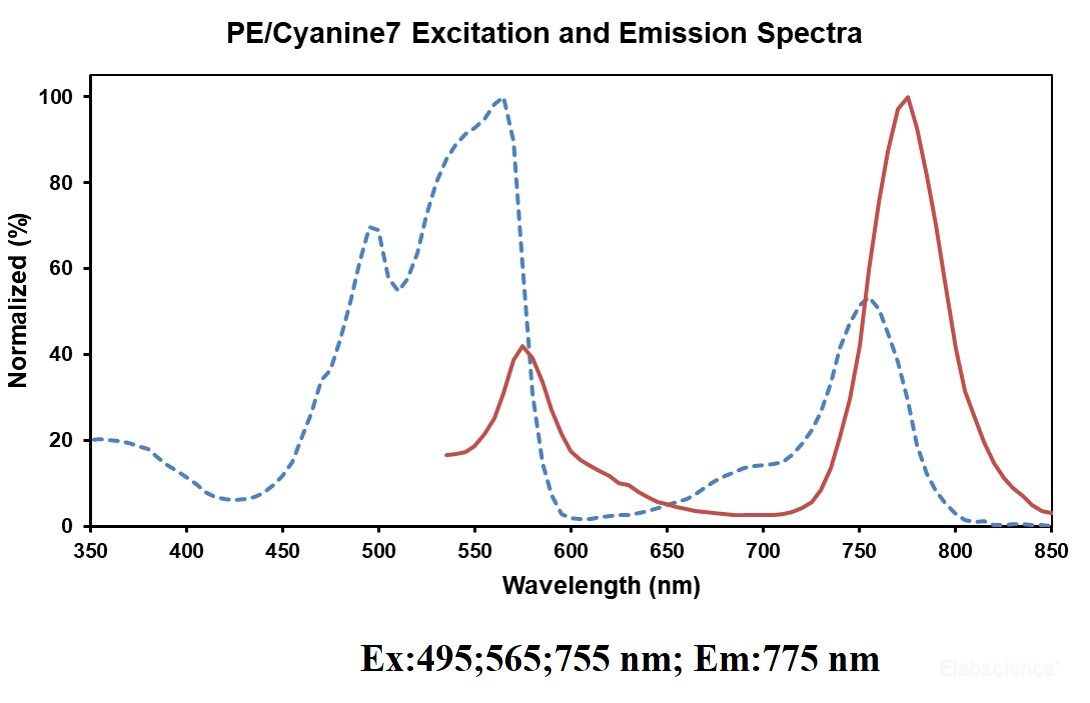PE/Cyanine7 Anti-Mouse CD80 Antibody[16-10A1]
SKU: E-AB-F0992UH-25
To better serve you, we would like to discuss your specific requirement.
Please Contact Us for a quote.
PE/Cyanine7 Anti-Mouse CD80 Antibody[16-10A1]
| SKU # | E-AB-F0992UH |
| Isotype | Armenian Hamster IgG |
| Applications | FCM |
| Host | Armenian Hamster |
Product Details
| Form | Liquid |
| Clone No. | 16-10A1(See Other Available Formats) |
| Host | Armenian Hamster |
| Isotype | Armenian Hamster IgG |
| Isotype Control | PE/Cyanine7 Armenian Hamster IgG Isotype Control[PIP] [Product E-AB-F09853H] |
| Reactivity | Mouse |
| Application | FCM (See the Application Description) |
| Storage Buffer | Phosphate buffered solution, pH 7.2, containing 0.09% stabilizer and 1% protein protectant. |
| Recommended Use | Each lot of this antibody is quality control tested by flow cytometric analysis. Please check your vial before the experiment. Since applications vary, the appropriate dilutions must be determined for individual use. We suggest each investigator should titrate the reagent to obtain optimal results [The recommended concentration is 0.1-1 μg/106 cells in 100 μL volume]. |
| Shipping | Biological ice pack at 4℃ |
| Stability & Storage | Keep as concentrated solution. Store at 2~8°C and protected from prolonged exposure to light. Do not freeze. Centrifuge before opening to ensure complete recovery of vial contents. This product is guaranteed up to one year from purchase. |
| Conjugation | PE/Cyanine7 |
| PE/Cyanine7 is designed to be excited by the Blue (488 nm), Green (532 nm) and yellow-green (561 nm) lasers and detected using an optical filter centered near 775 nm (e.g., a 780/60 nm bandpass filter). | |
|
|
|
Fluorophore
Conjugation: PE/Cyanine7
PE/Cyanine7 is designed to be excited by the Blue (488 nm), Green (532 nm) and yellow-green (561 nm) lasers and detected using an optical filter centered near 775 nm (e.g., a 780/60 nm bandpass filter).
Recommended usage
Each lot of this antibody is quality control tested by flow cytometric analysis. Please check your vial before the experiment. Since applications vary, the appropriate dilutions must be determined for individual use. We suggest each investigator should titrate the reagent to obtain optimal results [The recommended concentration is 0.1-1 μg/106
cells in 100 μL volume].

![PE/Cyanine7 Anti-Mouse CD80 Antibody[16-10A1]](http://www.msesupplies.com/cdn/shop/files/Elabscience_8215fd44-141c-4cd1-a451-6cab82a6b3cb_large.jpg?v=1722947430)
![PE/Cyanine7 Anti-Mouse CD80 Antibody[16-10A1]](http://www.msesupplies.com/cdn/shop/files/Elabscience_8215fd44-141c-4cd1-a451-6cab82a6b3cb_compact.jpg?v=1722947430)
![PE/Cyanine7 Anti-Mouse CD80 Antibody[16-10A1]](http://www.msesupplies.com/cdn/shop/files/E-AB-F0992UH_compact.jpg?v=1722947452)
